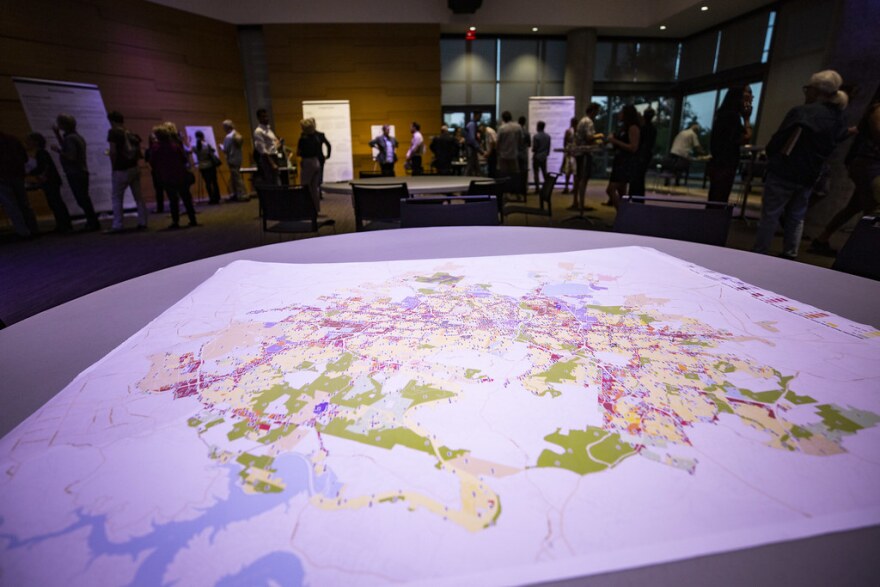The Austin City Council took an initial vote Wednesday to finalize a new version of the city’s land development code, the rules determining what can be built across the city and where.
The vote signals the beginning of the end of a nearly eight-year and $12-million journey to rewrite the code.
"Change is hard, changing systems is hard, but I'm really proud of our council," Mayor Pro Tem Delia Garza said before the vote.
The council has two more votes to take before the code is adopted, which is expected to happen in March.
Before voting Wednesday, council members amended staff’s version of the code released in October, asking city planners to encourage the building of smaller homes, to strengthen water conservation measures and to find ways to get more commercial buildings such as grocery stores and child care centers within neighborhoods.
The Austin metro area has been one of the fastest growing in the country, and the demand for housing has grown along with it. In 2017, the city council set a goal of building 135,000 new housing units over the next decade, with 60,000 of those being affordable to families making less than the median income.
“I really truly believe that this code rewrite is a huge opportunity for our city to allow more housing and more housing for more people at all income levels,” Council Member Natasha Harper-Madison said. She and others said they think council members share the same goal of building more housing – especially affordable housing – but disagree on how to get there.
That was clear in the vote, which was split 7-4. Council Members Leslie Pool, Alison Alter, Kathie Tovo and Ann Kitchen, who represent parts of Central and West Austin, opposed the code rewrite. The four council members said residents did not trust the revision process.
“I think right now we’re still in the midst of a very difficult and divisive process,” Tovo said.
One of the more contentious pieces of the code are the so-called "transition areas" near busy roads with public transportation options where staff has allowed more housing to be built. Tovo asked that these zoning changes not be applied so deeply into residential neighborhoods, saying she fears this could encourage the selling off and demolition of existing homes. She attempted to pass an item that would limit these changes uniformly across neighborhoods.
But Garza countered, arguing the city can’t contend with racist patterns of building by treating all areas the same.
“When development was pushed to other parts of this town, for whatever reasons protecting whatever things, we didn’t talk about – this neighborhood shouldn’t have to take this and this,” she said. The city’s Planning Commission, which sent recommended code changes to the council last month, had asked members to consider moving zoning changes from East Austin to parts of West Austin.
The city’s quest to simplify and update its more-than-30-year-old land code began in 2012, when a comprehensive plan for the city, called Imagine Austin, was passed. The plan envisions a “compact and connected” city, with denser housing options in more central parts of the city, in the hopes of preventing Austin from sprawling outward.
To do this, Imagine Austin prioritizes smaller, denser housing – duplexes, fourplexes and small apartment buildings. But Austin’s current land rules make it difficult to build anything but large apartment buildings and single homes.
“Achieving these goals will require a comprehensive review and revision of the Land Development Code," the Imagine Austin text states.
The process stalled last summer, when council members voted to nix CodeNEXT after what Mayor Steve Adler described as “misinformation” throughout the process. Council members regrouped earlier this year, deciding on several goals they wanted the code to accomplish, such as providing more affordable housing and discouraging the tear down of older, cheaper housing.
Before taking a vote, Harper-Madison asked that her colleagues consider all Austinites in any changes they propose over the next months.
“Change is frightening and sometimes growing is uncomfortable,” she said. “I know we’re all extraordinarily passionate about our districts, as we should be, but we should also be very passionate about our city as a whole.”
This post has been updated.
Got a tip? Email Audrey at audrey@kut.org. Follow her on Twitter @AKMcGlinchy.
If you found the reporting above valuable, please consider making a donation to support it. Your gift pays for everything you find on KUT.org. Thanks for donating today.







